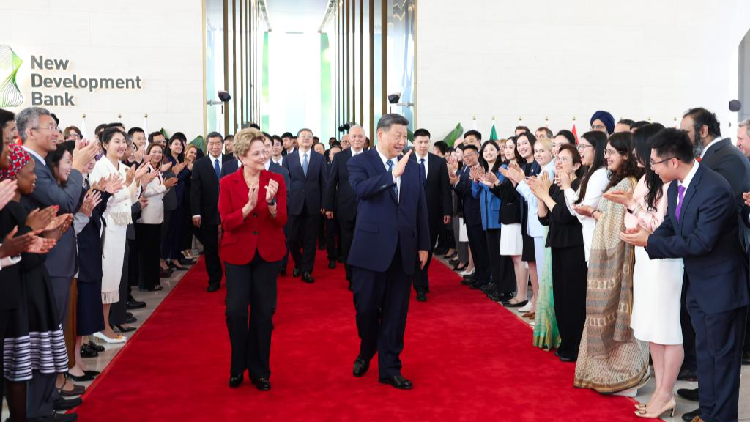Jenni Byrne is just getting started
The strategist behind Pierre Poilievre's campaign to be Canada’s next prime minister is a force and a cause for concern.


OTTAWA — For most Conservatives in Canada, there is only one Jenni. A lifetime in politics and a resume packed with high-profile wins (and one devastating loss) has rendered her surname superfluous.
Ask any charter member of the capital’s gossiping class about Jenni Byrne, and they'll dish until last call. She is legend in the Ottawa bubble, which means the anecdotes that spill are often part-truth, part-tall tale.
She is the Brutus who took a knife to the political career of Conservative leader Erin O’Toole, a onetime close friend, trashing him on TV and podcast outings, while working behind the scenes on the Feb. 2 ouster that cleared the way for a new candidate: Pierre Poilievre.
“Kudos to her,” Fred DeLorey, O’Toole’s national campaign director in 2021, tells POLITICO. “You can't deny her abilities when she takes out leaders and then helps put in the one she wants. I don't know anyone else who could accomplish that.”
Enemies consider Byrne a ruthless, no-holds-barred politico willing to turn on allies the moment she's crossed. But she’s also a compassionate conservative — abandoning a campaign at a pivotal moment to fly across the country for the funeral of a colleague's mother.
“No one has better instincts or understanding of Canadian politics,” adds DeLorey, who has worked alongside and more recently against Byrne, since 2004. “It sounds so clichéd — but the reality is she's a fucking force of nature.”
Others fear her combative style — fellow Conservatives aren’t spared — risks alienating supporters and poses a threat to the movement.
One of Byrne’s colleagues from the Harper years called her “a scorched-earth tactician,” noting the downside that can overshadow her intelligence and experience. “That's something that can be dangerous,” the person, who supports Poilievre, said in an interview. “We have to, as a party, remain united after the leadership campaign if we're to have a chance of winning.”
Earlier this year, when POLITICO’s Ottawa Playbook asked Byrne who was behind the scenes on Poilievre’s campaign, she reduced herself to “adviser.” But everyone knows she's running the show.
POLITICO talked to dozens of key Conservative players, including seasoned operatives and senior politicians who have seen Byrne up close on the job. Many — especially her detractors — were unwilling to go on the record. Byrne didn't respond to interview requests, but many of her friends and antagonists were willing to discuss her sway on Canadian politics.
If, as expected, Poilievre is victorious when the race ends Saturday, he'll have a legitimate shot to take down Justin Trudeau in the next election.
The Conservatives suffered two losses to the Liberals in 2019 and 2021 — campaigns where Byrne was on the sidelines, sometimes mocking her own party. With Poilievre as her chosen candidate, Byrne is back.
The prospect of her return to the Prime Minister’s Office is a “frightening thought,” a senior Conservative tells POLITICO.
“There's a lot of venom and vindictiveness that comes from her,” they said. “She made a lot of enemies and stepped over a lot of toes.”
What she does next will mark — and some warn scar — the Conservative Party and Canadian politics as a whole.
All about ground game
Byrne has been a consequential player behind the scenes of Canadian conservatism since the mid-2000s, and first cut her teeth as an organizer with the Reform Party in the 1990s.
She was master of the dark arts in former prime minister Stephen Harper’s issues-management shop, became the first woman to lead a national campaign to majority victory, crossed swords with Conservative lawmakers, accelerated the demise of weak leaders, and played a key role in Doug Ford's unlikely rise to the premier's office in Ontario.
Former colleagues marvel at what they say is a rare, deep understanding of what everyday voters, especially conservative-minded folks, care about.
Ken Boessenkool, an architect of Harper campaign policy, watched Byrne develop in the former leader's early war rooms.
She wasn't focused on policy design. She cared most about selling it to real people.
"We would develop a broad campaign narrative. She would be in the room for that, but that wasn't her thing," he tells POLITICO. "She would say things like, 'That's not going to work on the ground,' which wasn't her saying don't do X or Y issue. She was just saying, 'I need something I can use on the ground.'"
During her years in the PMO, DeLorey said Byrne would remind Conservatives around her to never forget their bedrock of support in small-town Canada.
In one example of Byrne driving home the point, DeLorey remembers her bringing a photo of herself and her dad — in hunting gear and, in the backdrop, a deer slumped over the top of a pickup truck — to at least one PMO meeting.
“A lot of times, governments and people in Ottawa forget who it is that they're representing and who they're fighting for,” DeLorey said of Byrne, who has close ties to her Ontario hometown Fenelon Falls, a community of 2,500. “She's very, very good at reminding people.”
When it comes to politics, those same colleagues say she loves you or hates you — there’s no middle ground.
“She’s somebody who is a very positive person by nature and a very happy person by nature,” Conservative strategist Kory Teneycke, who has been a good friend and colleague of Byrne’s for nearly 25 years, tells POLITICO.
“But if you're in the arena with her, you don’t want to be on her bad side — because she’ll kick your ass.”

‘Master of the ground game’
Party insiders say the success of Poilievre’s leadership crusade — including how he’s regularly drawn swarms of people to rallies — is a prime example of Byrne's strength: “winning the ground game.” In political shorthand, it’s the art of identifying voters, sharpening the message, cutting down opponents, funneling resources to the right places, mobilizing volunteers and getting out the vote.
From the first moment, Poilievre's campaign tossed out the typical playbook. The other candidates hosted in-person launches. He blasted out a video on social media.
Poilievre has mostly avoided mainstream media, save for offering an interview for a Maclean's profile in his leadership bid's early days. But he spoke at length to Jordan Peterson, a controversial psychologist whose global YouTube following runs into the millions.
He went negative the second he declared his candidacy, dismissing rival Jean Charest as a tax-loving Liberal and contender Patrick Brown as a liar who'd say anything to win. Byrne herself tweeted searing attacks, a marked departure from her preference for the backroom during earlier campaigns.
When the Conservative Party announced 678,000 eligible voters in the leadership contest, Poilievre claimed to have signed up more than 300,000. The campaign's many critics charge that feat was only accomplished by courting conspiracy theorists and whipping up the trucker convoy crowd. Some call him Trump-lite.
Poilievre hasn't directly endorsed the conspiracy theory that holds the World Economic Forum is bent on eroding Canadian sovereignty and exerting control over Canadians' lives. But he has gleefully promised never to send a Cabinet minister to the WEF's annual summit in Davos if he ends up in the Prime Minister's Office.
It's all a play to a new base of potential voters who are skeptical of politicians and the institutions that underpin Canada's democratic system.
Poilievre shocked observers at the party's first English-language debate by promising to fire Bank of Canada governor Tiff Macklem for pandemic monetary policy. He also made headlines when he suggested cryptocurrencies could "allow people to take control of their money from bankers and politicians."
But the promises had their intended effect.
Right from the get-go, the Poilievre-Byrne effort attracted record numbers of new members to the Conservative Party. Large rallies are unusual in Canadian leadership campaigns — but they filled banquet halls and hockey arenas from Nanaimo, B.C., to Halifax and dozens of stops in between.
“This was a campaign that came out of the gate right away on fire — and I mean that in a good way,” said DeLorey, who, as executive chair for Poilievre’s leadership rival Brown, had a front-row seat.
“They were just very well polished. They knew what they were doing and also the crowds they were getting — they were something.”
Conservative MP Melissa Lantsman says you can ask Byrne about a neighborhood in any riding — and she will tell you what’s going on, poll by poll.
“She's got an incredible ability to see what's coming, move resources faster and ahead of the game — and be able to put those votes in a box,” said Lantsman, who has known Byrne since their days in the party’s 2006 campaign war room.
Teneycke called Byrne an ace in “the currencies of politics.”
“Jenni is … a master of the logistics and the tactile form of campaigning where you’ve got to get people to knock on doors or ID vote or sell memberships,” he said. “She's widely regarded on ground organization as the best person in the conservative movement in Canada.”
Teneycke has followed her growth from the start. He remembers his first conversation with Byrne in 1996 after she had left a message with the Reform Party youth recruitment web portal.
“I called her back and she was working at the IGA [grocery store] in Fenelon Falls,” he said.
Byrne signed up for the party.
Her first taste of politics came as an operative with the Reform Party, which evolved into the Canadian Alliance. Doug Finley, a legend in conservative circles in the art of organizing winning campaigns, took her under his wing.
They worked together at the Canadian Alliance, and then Harper's run for the leadership of the new Conservative Party. When Finley ran the 2006 and 2008 Conservative campaigns, Byrne served as his deputy.
Byrne sharpened those skills constantly. Between general campaigns, she always found ways to gather intel from local party activists and knock on doors to hear directly from voters.
"Whenever there was a byelection to be run, she'd be like, zippity doo dah," said Boessenkool.
Loyalty above all else
Byrne has the trust of some of Canada's most-senior Conservatives — from her old boss Harper to Ontario Premier Doug Ford.
But her relationship with Poilievre has a different dynamic.
Their background includes a long-term romantic relationship, a bond once described on Poilievre's Wikipedia page as “common law” — a suggestion that things were serious.
Byrne has acknowledged their past on The Curse of Politics, the must-listen podcast for politics junkies in Canada.
They got together before he was first elected as an MP in 2004, then parted months before Byrne steered Harper's team to a majority win in 2011. On Jan. 29 that year, the same user scrubbed the relationship from both of their Wikipedia pages.
“That's clearly long in the rearview mirror,” DeLorey said. “Now they have a very good professional relationship.”
A Conservative who worked with Byrne in the Harper government said: “Pierre is not the kind of guy who trusts people easily, neither was the former PM. And so it takes a long time for him to get comfortable with someone…. The fact that it exists between him and Jenni already is extremely helpful.”
The insider described Byrne as “Pierre’s most-effective weapon.”
A target on the leader
The thing about weapons, though, is that they blow things up. And Byrne didn’t hesitate to destroy a former friend for Poilievre’s advantage.
Byrne and then-Cabinet minister Erin O'Toole were close at the end of the Harper era. She had helped elect him to Parliament in a 2012 byelection, and for a time lived at a home O'Toole owned in Ottawa.
A few months after the devastating defeat, Byrne landed on Bay Street at the financial communications firm Bayfield Strategy. O'Toole made the introduction.
Over time, their relationship frayed, though even insiders close to O'Toole have trouble explaining the source of the rift.
Six years later, as O'Toole fought his first general election as Tory leader, Byrne undermined him publicly on the Curse of Politics pod. He was a fake Conservative, she said, who didn't represent the party's founding values.
Poilievre veered away from the official Tory campaign, launching his own ads that road-tested a tagline he would later use in his leadership campaign: "Make more, cost less. Paychecks, not debt."
As O'Toole attempted to rebound after a tough loss to Trudeau, Byrne worked behind the scenes — and out front — to oust him from the party leadership.
The Conservative caucus booted O'Toole from the leader's office in early February as a dramatic trucker convoy occupation of downtown Ottawa was settling in for the long haul.
The stage was set for a Poilievre leadership run, which some say Byrne had been plotting ever since the Ottawa-area MP declined to take the plunge in 2020.
Not a hyphenated Conservative
Of the dozens of people POLITICO reached out to — many of them who have known Byrne for decades — very few could put their finger on what drives her in politics.
That is, except for her desire to win — and to crush Liberals.
“It's hard to understate how single-mindedly Jenni thinks about politics,” said one former colleague from the Harper days. “She cares about it very deeply and so she is quite aggressive in pursuing what she thinks is the right course.”
The same colleague also argued the aggressiveness label is problematic — not least because it is unfairly given to women in positions of power.
Byrne also gained a reputation for mentoring young women on Parliament Hill, a mission she cared about deeply.
Jamie Mozeson, whose first gig after a Hill internship in 2008 was in Byrne's issues management office, told POLITICO many women mentored by Byrne are on the Poilievre campaign — including in senior positions.
Ask why they're there, and they’ll point to Byrne. "She's very loyal to us. If she needs something done, she'll ask," said Mozesun. "We always say yes."
But there will never be a universal view of Byrne among her many former colleagues.
"She's mentored a lot of people. You will find fully paid-up members of the cult of Jenni," said Andrew MacDougall, Harper's former director of communications. "By the same token, you'll find people that have been told they've had a Jenni problem in government. And that usually meant you were not long for whatever role you had in that government."
One senior Conservative who worked with Byrne in the Harper government said she had a bit of a chip on her shoulder because she was never the one reading Friedrich Hayek and Edmund Burke.
“I don't know what precisely motivates her,” the insider said. “Her conservatism is instinctual. It's not cerebral. It doesn’t really strike me as very ideological, it’s primarily partisan.”
The source said she has never seemed to fall into the category of someone animated by a particular worldview, personal ambition or any single issue.
“She's not there because she has a clear set of policy goals,” the insider said. “She wants to beat Liberals and she wants to win, and she leaves it to other people to figure out what you might do after you win.”
In this sense, Byrne could be a good match with the zeitgeist-savvy Poilievre, who seems to have long had a good sense of what he would do with the political power of the Prime Minister’s Office.
Building the juggernaut
If Poilievre secures the Tory leadership, insiders say Byrne is unlikely to spend her time in the Office of the Leader of the Opposition where he'll be working to establish himself with Canadians as a governing alternative.
Instead, she’s expected to focus on a bigger target: Winning the next federal election.
One senior Conservative thinks Byrne is likely to pour her energy into readying the Conservative apparatus for another crack at the Liberals.
“The CPC has fallen well behind the Liberal Party in terms of digital campaigning and voter ID,” the Conservative source said. “Those are all things that Jenni would like to be involved in improving. So, I think that will be her real interest if Pierre is victorious.”
Byrne could opt for a part-time role in politics. She's grown her own consulting firm, Jenni Byrne + Associates, for the past three years — and her proximity to Poilievre will be great for business.
Everybody in her orbit agrees she has options — and she's not done yet.
“You have to be tough, really fucking tough, if you want to work in this business — period,” said Teneycke, who also described Byrne as a pioneer in Canadian politics.
“To blaze that trail, Jenni had to be tougher than a lot of people in order to be successful. It's a testament to her character, her perseverance, that she's gone as far as she has.”
DeLorey says he hasn’t spoken with Byrne about her next steps. He is certain about one thing.
“She ain’t going anywhere — she's going to be in the center of all of this in one way or the other.”












